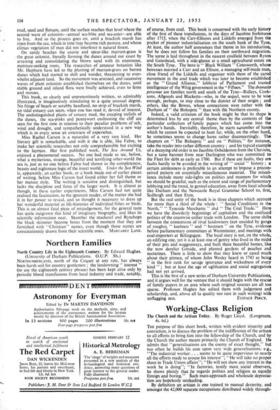Working-Class Religion
The Church and the Artisan Today. By Roger Lloyd. (Longmans. 4s. 6d.)
THE purpose of this short book, written with evident sincerity and conviction, is to discuss the problem of the indifference of the artisan to all efforts to bring him into the fellowship of the Church, and by the Church the author means primarily the Church of England. He admits that "generalisations are the enemy of exact thought," but too often he builds his case upon very wide generalisations: e.g., "The industrial worker. . . seems to be quite impervious to nearly all the efforts made to arouse his interest"; "He will take no proper share in Trade Union affairs"; "He will not show any interest in the work he is doing". "In factories, testify most, social observers, he shows plainly that he regards politics and religjon as equally foreign and boring." Such mass-approach and wholesale deprecia- tion are hopelessly misleading.
By definition an artisan is one trained to manual dexterity, and amongst the 42,000 separate occupations distributed widely through-
out Great Britain, each with its own wages, rates, conditions, skills and traditions, are to be found such strange practitioners as bone proppers, fish-hook batterers, stiletto-forgers, bar-punchers, todd- softeners and scaffies. Therefore, it might have been wiser had the writer related the shortcomings and indifferences to some artisans, just as he might as truly have related them, to some stockbrokers, some retail distributors or to some doctors. Even so his investi- gations have produced some intriguing results. Artisans are seldom to be found in churches which are best attended: e.g., "in places like Bournemouth" but "those who are present are generally of the -foremen type." He writes, "Analyse one by one crowded con- gregations at missions and it is realised that the genuine artisans amongst them do not amount to two per cent. of the total." One wonders by what close and intimate method of investigation such conclusions were established.
To deal with the challenge presented by the indifference of the artisan to meeting his spiritual needs the author is of opinion that special missions are of little avail. Apart from acts of divine intervention (" The wind bloweth where it listeth"), he feels that the artisans may be won for Christ if at some critical moment they find fellowship in some Christian congregation; that broadcast religious plays and such "exceedingly effective evangelistic work as the voyage of the S.P.G. ship 'Centurion' round the South coast ports" have proved of value. But beyond all else he is convinced that the Church should lose no opportunity of getting quickly into touch with young married couples who have settled on a new housing estate. Whilst one must accept his suggestions, the feeling is left that they do not specifically relate to the artisan. It may be that greater success would follow the mission of the Church "to touch the artisan" if those who are set in authority over him and who profess and call themselves Christians would observe in all their dealings and relationships high standards of justice, honesty, tolerance, charity and courtesy. Such too would seem to be nearer to the heart of the age-old Artisan who, when asked by one, "What shall this man do? " said," What is that to thee? follow thou me"— a longer but safer path.
R. R. HYDE.



































 Previous page
Previous page